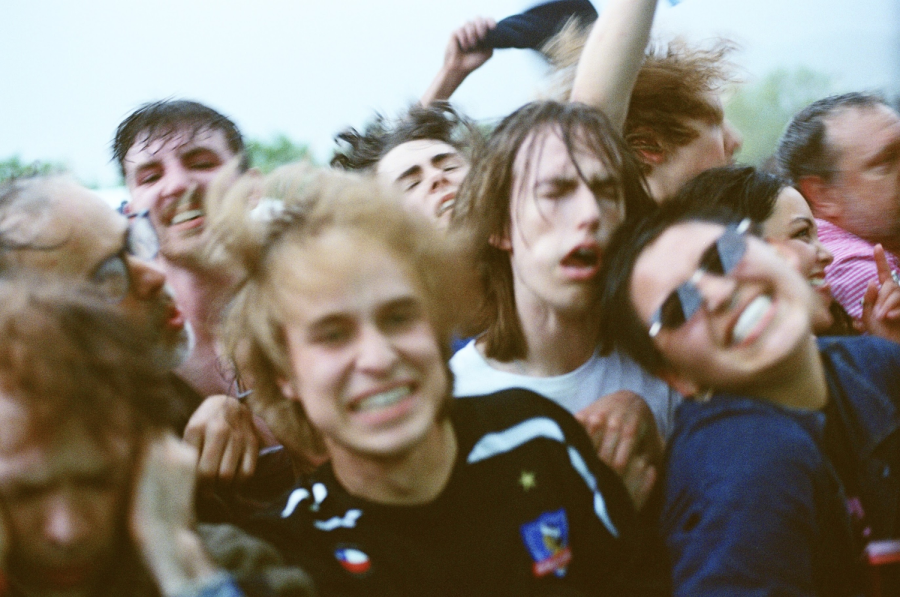Jarvis: Don’t Forget Etiquette at Music Festivals
Fans in the mosh pit during Osees’ performance at the 2023 Kilby Block Party on May 13, 2023. (Courtesy of Robert Sagers)
May 23, 2023
I went to this year’s Kilby Block Party music festival and had a fantastic time. However, I was disturbed by the way some concertgoers — especially tall, white men — casually disrespected others. Privileged people should be aware of etiquette at music festivals and concerts and be conscious of the space they are taking up.
Etiquette refers to the social norms and procedures that should be observed in particular settings. Etiquette can differ depending on the type of concert, and we must be aware of how it applies to all contexts. For example, at an orchestra concert or an opera, attendees are expected to turn their phones off. They should be silent during the performance and not clap between movements.
Music festivals require different etiquette since they are more laid-back and the crowd is typically standing. In these spaces, people should say “excuse me” while moving through a crowd, look out for others and throw their trash away. They should not push or shove others to get closer to the stage. If they are moshing, they should be aware of those around them, as moshing can be made dangerous by inconsiderate people, typically white men. Lack of proper behavior at musical events can make other concertgoers feel uncomfortable, unsafe and disrespected.
While these etiquette guidelines seem self-explanatory, it was shocking how many people did not follow them at the Kilby Block Party. In an attempt to get a decent spot at The Strokes’ concert, my friends and I joined the growing crowd 20 minutes before the show began. But we soon found ourselves stuck, tightly packed between people with minimal space to move or breathe. Dancing would have been out of the question. Still, men shoved past us, yelling for their friends to follow.
Thankfully, we were able to make our way out before the show began. Standing near the back, we had a significantly more enjoyable time than if we’d stayed squashed in the middle of the crowd.
My experience the next day at the Mannequin Pussy concert, a punk rock show, stands in complete contrast to The Strokes. Though there was a large crowd, people were respectful, making space for each other, letting others go in front of them and making sure those around them were comfortable.
Many people at this show were people of color, queer and non-men. Punk shows are generally a safe space for people of these demographics, as punk and activism are inseparable. Punk, at its core, rejects the social norms of the middle and upper classes. Conversely, many of the people in The Strokes crowd who were pushing past others were tall white men. While being tall isn’t inherently bad, white men can utilize their height to dominate spaces without consideration for others.

People who hold privileges such as being white, men or cishet often feel entitled to more space than others everywhere, not just at concerts. I’ve noticed a pattern in some classes, where white men speak louder than others. They feel as if their opinions are more correct or more important, and they are more likely to talk than listen. Even though the percentage of women attending college is higher than men, men still manage to take up the most space and time in classrooms.
More privileged people don’t have to think much about the space they take up. Meanwhile, disabled people, women, queer people and people of color are acutely aware of their space, the size of their bodies and the volume of their speech. These individuals are more empathetic because they’ve been given less consideration and know they’re more likely to be perceived as causing a problem. But they deserve as much space and consideration as everyone else.
In shared spaces like music festivals, attendees should be aware of how they can make others more comfortable. Tall people should let shorter people pass in front of them, and men should keep their hands to themselves. Festival directors must give disabled people the same quality of access that they give to able-bodied people. Some music festivals claim to be accessible for all, but do the bare minimum for their disabled guests or don’t provide ADA lines.
We need to make more spaces that are safe for marginalized people, such as the Mannequin Pussy concert. By following the punk scene’s lead, fans of popular bands such as The Strokes can make those shows safer for others.
Everyone deserves to enjoy the shows they came for, and we can make this possible by observing proper social etiquette and having personal awareness. We must examine our own privileges and learn how to make better spaces for others.








